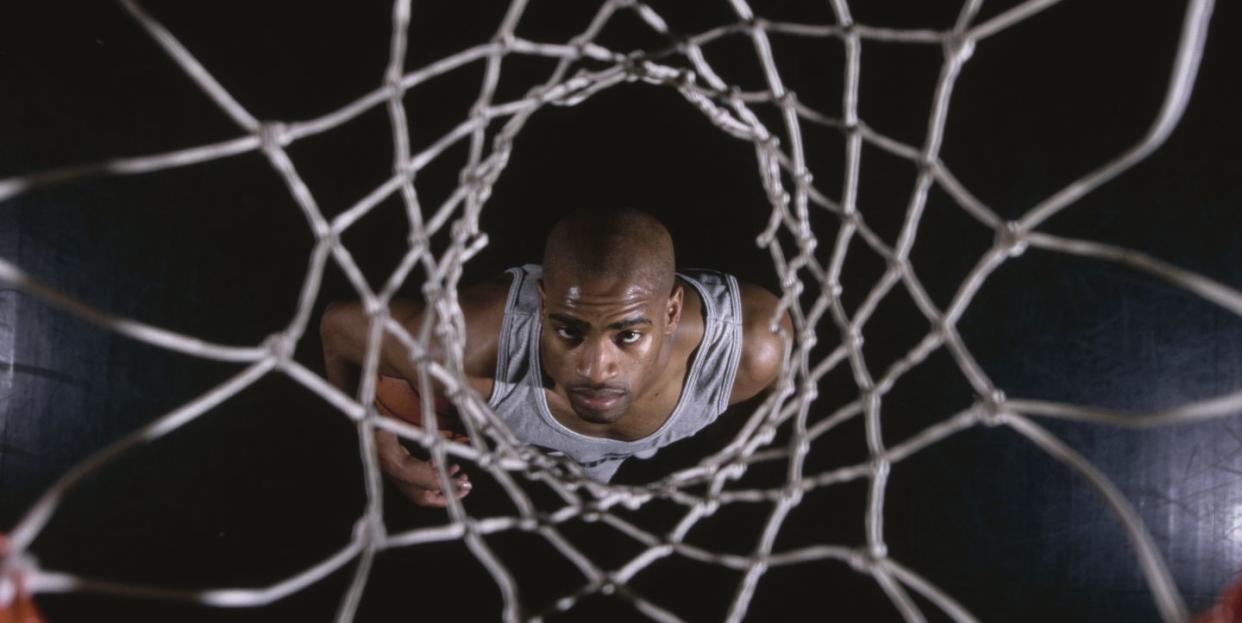Vince Carter Never Second-Guessed 'The Dunk of Death'

- Oops!Something went wrong.Please try again later.
- Oops!Something went wrong.Please try again later.
- Oops!Something went wrong.Please try again later.
- Oops!Something went wrong.Please try again later.
After 22 seasons in the NBA—the longest career any basketball player has ever had in the league—Vince Carter is in a Toronto Raptors jersey once again. But just for a moment.
Last week, AT&T scanned a 3-D model of Carter and LA Clippers star Paul George into its All-Star Weekend Playmaker Arcade VR video game–but it still meant the world to the eight-time All-Star. "It was cool to put the Raptors uniform on again and get to be in the game," Carter tells me. "Especially with some of the great names of today. It doesn’t get much better than that."
Carter is excited for the Dunk Contest, which isn't much of a surprise, since Carter is known for one most famous dunks of all time. He threw down in the 2000 Summer Olympics. Sydney, Australia. On September 25, 2000, Carter (6'6") jumped over French center Frédéric Weis (7'2"!) and slammed the ball into the basket. The French media later dubbed the incredible feat "le dunk de la mort," which translates to "The Dunk of Death." Carter led the U.S. Men's basketball team to a gold medal.
Sure, active NBA slam-dunkers– Kenyon Martin Jr., Trey Murphy III, Mac McClung, and Jericho Sims—will perform dazzling jams this Saturday night during All-Star Weekend. But nothing beats the thrill of vaulting a giant in a high-stakes Olympic game. In Carter's NBA season following the "Dunk of Death," he averaged a career-high 27.6 points per game and brought the Toronto Raptors to the Eastern Conference Semifinals. He continued to play basketball until 2020 for eight different teams, only retiring after the pandemic ended what became his final season. Now a college basketball analyst for ESPN, Carter took some time away from dunking in VR to talk to Esquire about All-Star Weekend, the lasting legacy of his famous dunk, and why it meant so much for him to have such a long career in the NBA.
ESQUIRE: Do you enjoy the All-Star Game more now that you're on the other side of it?
VINCE CARTER: My kids are getting older now, so they've started to watch it. I didn’t typically watch the Dunk Contest live, and none of my friends know that. But I always get all those texts that are like, "What did you think of that?" Now that I’m in the media, I’m more social and I pay attention a little more, because I have to. You mention guys like Mac McClung and I know who that is now. So I think this is going to be a very entertaining Dunk Contest.
Players like Steph Curry have changed the game by putting an emphasis on the three-point shot. What do you think it is about the dunk that makes it such a timeless move?
You said it right there: it’s timeless. It’s just guys doing things that the average human being who plays basketball can’t do. You know what you can and can’t do. You know your limitations. And then what you just witnessed [someone do it]. It's like, Is this real? That’s impossible.
You were an active player for 22 seasons—the longest career in the NBA of all time. How do you measure success in the league?
Guys who just take an advantage of their opportunity to play. Everybody’s path in the NBA is different. Larry Bird was forced to retire because of his back, but he probably could’ve played longer. Allen Iverson—I know for a fact could’ve played longer. But as we get older, our goals change. Guys [had to decide] what they were willing to accept and what they wouldn’t. I was able to transition from a superstar player with a lot of touches, ball always in my hand, to a different role. And I was okay with that. You know, I sacrificed my scoring average, but I loved the game. I was not ready to retire just because I wasn’t a starter anymore. And it worked. I wanted to see how long my body would allow me to play this game at this level, and that was my focus. Retire? Why? And then go and do what? If you love it, do it. We’re seeing LeBron James do it.
Looking back on your famous Olympics dunk—nicknamed "The Dunk of Death"—where does the confidence come from to be able to pull off a move like that?
If I knew better, I never would have done that. [Laughs.] That was a basketball instinct thing—I was attacking the rim. I just wasn’t thinking, Oh, there’s a 7’2” guy. This is the time. I took advantage of the opportunity. I got a steal out of transition. What are the odds? That’s what came out of it. And as the story goes, I did not know what happened until later because my teammates told me. But that [dunk] was not my intention. If you would have asked me before if I’ve ever tried to dunk over a 7’2” player—or even a 6’10” guy—in practice or a game before, I would have told you, "No. I’ve never tried it. I didn’t know I could do that." After that, I tried to jump over a guy who was 6’3” and I almost hurt me and him.
Do you take pride in the lasting legacy of that dunk?
I always know when the anniversary of the dunk is coming up because I see more and more clips on social media with my name tagged. It’s pretty cool to be part of history that people always remember, like they marked it on the calendar. It’s like, This is the day you were acknowledged for your great work. And that’s an incredible feeling.
You Might Also Like

